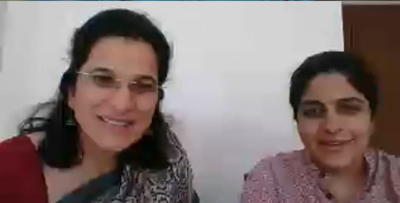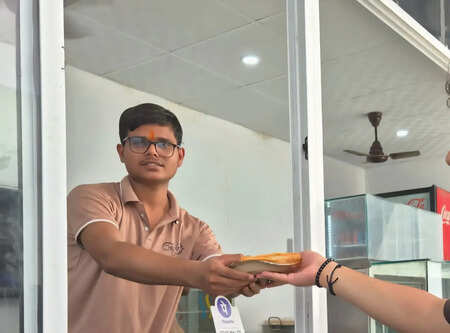Filing an RTI made easy as activists lead workshop at BU
Times of Bennett | Updated: Jun 03, 2021 12:46

By Sharon Varghese
Greater Noida:
Filing an RTI plea may seem daunting but with a few simple tips, anyone can use their right to exercise this power.
Since its passing in 2005 the Right to Information Act has become a crucial part of activism and citizen participation in government affairs. Additionally, the advent of accessible internet services has made the filing and redressal process has become efficient.
During a workshop on the Right to Information Act, Anjali Bhardwaj and Amrita Johri of theSatark Nagrik Sangathan (SNS), spoke to students of the Times School of Media
“The power of the Right to Information act strongly depends on how precise your questions are. The more open ended your queries are the easier Public Information Officers find ways to deny it. Precise questioning is a huge factor in getting relevant answers”, says Anjali Bhardwaj.
Some tips to help you file an RTI application:
Do’s
Applications can also be filed offline through Speed Post or by visiting the Public Information Officer depending on the department.
Anything the government is executing, implementing or planning would be recorded across various files and departments, our main focus while filing an RTI is to focus on trying and getting access to that crucial information through the questions we ask, says Amrita Johri.
Recent Challenges faced by the RTI Act
An important way to ensure the independence of these commissions was to set a fixed tenure, salary and pensions for the Information Commissioners under the law which was at the level of Supreme Court judges of the government.
“In 2019, the government quietly brought in an amendment, which said that the central government would now decide the tenure, salary and pension for any Information Commissioners, which would definitely impact the commissioner’s willingness to take any action against the ruling government, creating a huge issue,” Ms. Bhardwaj added.
The workshop provided an interesting and interactive opportunity for students to learn more about the nuances of the RTI.
"It helped me understand the use and impact the act has. It reinstated its power in my perception as I got to know more about it," said Akshita Chaplot, a student attending the workshop.
A key factor in a democracy is the people power to question authorities and hold them accountable to get more information in the public domain and utilize this right of ours.
Backgrounder: TheSatark Nagrik Sangathan (SNS), an organization working to promote transparency and accountability in government administration.
Anjali Bhardwaj, an RTI expert, founded SNS in 2003 and Amrita Johri is an active member of the Sangathan.
Recently, Bhardwaj was awarded the newly-constituted International Anti-Corruption Champions Award by the US administration.
Greater Noida:
Filing an RTI plea may seem daunting but with a few simple tips, anyone can use their right to exercise this power.
Since its passing in 2005 the Right to Information Act has become a crucial part of activism and citizen participation in government affairs. Additionally, the advent of accessible internet services has made the filing and redressal process has become efficient.
During a workshop on the Right to Information Act, Anjali Bhardwaj and Amrita Johri of the
“The power of the Right to Information act strongly depends on how precise your questions are. The more open ended your queries are the easier Public Information Officers find ways to deny it. Precise questioning is a huge factor in getting relevant answers”, says Anjali Bhardwaj.
Some tips to help you file an RTI application:
Do’s
- Form your query in a manner that you are requesting for a copy of a government record.
Eg: If you want to find the frequency of getting rations from the government, your question would be on the lines of ‘Please provide a copy of the record/ order which defines the frequency on which a particular area will receive ration from the government?’
- In case you are unsure of the relevant department for your plea, mention Section 6(3) of the RTI Act which requires Public Information Officers to transfer the petition to the relevant department.
- Mention exact place and time period for which you are asking information.
- Filing an RTI application requires a nominal fee of Rs.10 for anyone above the poverty line. This amount can be paid online through credit/debit cards, UPI or Net banking, whereas in an offline case a demand draft or a court fee stamp can be attached.
- Forming questions in a question-answer format.
Eg: At what frequency do ration shops receive ration from the government in any particular area?
- Unnecessary elaboration of the situation or issue regarding which the RTI is being filed.
- Questions regarding security of State, relations with friendly foreign States, public order, decency, contempt of court or defamation are entirely denied.
- Providing incomplete contact information or address would make it difficult to provide a redressal for the application.
Applications can also be filed offline through Speed Post or by visiting the Public Information Officer depending on the department.
Anything the government is executing, implementing or planning would be recorded across various files and departments, our main focus while filing an RTI is to focus on trying and getting access to that crucial information through the questions we ask, says Amrita Johri.
Recent Challenges faced by the RTI Act
An important way to ensure the independence of these commissions was to set a fixed tenure, salary and pensions for the Information Commissioners under the law which was at the level of Supreme Court judges of the government.
“In 2019, the government quietly brought in an amendment, which said that the central government would now decide the tenure, salary and pension for any Information Commissioners, which would definitely impact the commissioner’s willingness to take any action against the ruling government, creating a huge issue,” Ms. Bhardwaj added.
The workshop provided an interesting and interactive opportunity for students to learn more about the nuances of the RTI.
"It helped me understand the use and impact the act has. It reinstated its power in my perception as I got to know more about it," said Akshita Chaplot, a student attending the workshop.
A key factor in a democracy is the people power to question authorities and hold them accountable to get more information in the public domain and utilize this right of ours.
Backgrounder: The
Anjali Bhardwaj, an RTI expert, founded SNS in 2003 and Amrita Johri is an active member of the Sangathan.
Recently, Bhardwaj was awarded the newly-constituted International Anti-Corruption Champions Award by the US administration.







